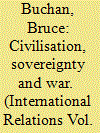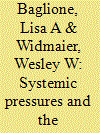|
|
|
Sort Order |
|
|
|
Items / Page
|
|
|
|
|
|
|
| Srl | Item |
| 1 |
ID:
072481


|
|
|
|
|
| Publication |
2006.
|
| Summary/Abstract |
In recent international relations (IR) literature and foreign policy, the concept of civilisation has enjoyed a surprising revival. Its recent use, however, has had little reference to those who did most to introduce it into modern thought, the thinkers of the Scottish Enlightenment. A re-examination of their thought suggests the need for a more nuanced view of civilisation, one that appreciates that the promise of domestic peace that comes with civilisation is also laden with the peril of war and new dynamics of international order. This article will focus on how David Hume (1711-76), William Robertson (1721-93), Adam Smith (1723-90) and Adam Ferguson (1723-1816) framed their understanding of civilisation and the civilising process in Europe. It will be argued that they were animated by the need to identify the processes at work in reshaping Europe, giving rise to a new international order of civilised societies and mighty sovereign states. Civilisation thus emerged as a process not simply of domestic refinement and pacification, but of the emergence of a new kind of international order between militarily powerful, 'civilised' and 'civilising' sovereign states with enhanced capacities for waging war.
|
|
|
|
|
|
|
|
|
|
|
|
|
|
|
|
| 2 |
ID:
072480


|
|
|
|
|
| Publication |
2006.
|
| Summary/Abstract |
In early 2004, the outbreak of political violence in Haiti and President Aristide's departure into exile provoked first a US and French military intervention to stabilize the security situation, and then deployment of a UN peacekeeping force. This article will first offer a historical narrative, placing the UN's recent intervention in the larger context of the intense international involvement in Haiti's affairs throughout the 1990s, including sanctions, UN-authorized use of force, a peacekeeping operation and years of peacebuilding efforts, all ending in failure. After identifying some of the policy lessons derived from the saga, the article then looks at the challenges ahead in relation to recent UN policy initiatives and reforms, notably on peacebuilding. It attempts to assess whether prospects for sustainable state-building in Haiti are consequently better than they were in 1994.
|
|
|
|
|
|
|
|
|
|
|
|
|
|
|
|
| 3 |
ID:
072483


|
|
|
|
|
| Publication |
2006.
|
| Summary/Abstract |
Over the economic crises of the 1990s, global economic understandings shifted from the early classical orthodoxy of the 'Washington Consensus' to a later Keynesian support for demand stimulus and capital controls. However, Russian policy - particularly after the 1998 ruble crisis - partly deviated from these broader trends, combining Keynesian capital controls with classical budgetary restraint. In offering a 'constructivist-institutionalist' explanation for this policy mix, we assume that agents can always interpret or construct events as varying types of crises, reshaping state society relations in the process. We then argue that classical interpretations of the early 1990s' crises legitimated orthodox policies and more importantly - alienated the Russian state from society. Given this backdrop, while later interpretations of the 1998 ruble crisis legitimated capital controls, the prior alienation of state from society precluded any domestic Keynesian coalition. Global pressures must, from this vantage point, be situated in specific social and institutional contexts.
|
|
|
|
|
|
|
|
|
|
|
|
|
|
|
|
| 4 |
ID:
072479


|
|
|
|
|
| Publication |
2006.
|
| Summary/Abstract |
The prohibition against torture has the status of a peremptory humanitarian norm. That is, it is considered binding on all states and no derogation under any circumstances is permitted. While the practice of torture has been widespread, until recently it had come to be understood that no representatives of the state could openly admit that they would use torture for fear of being removed from office and of having their state ostracized by 'civilized' nations. Why, then, given the rhetorical, moral and legal status of this prohibition, is torture being debated, contemplated and even resurrected as an unsavoury and allegedly necessary course of action in this counter-terrorist era? Why has the Bush administration set about trying to reduce the scope of what is meant by torture and degrading treatment, as well as to define a category of detainee who may be subjected to coercive methods of interrogation? And what efforts are being made to restore the status of a norm that has been seen as a distinctive kind of wrong? These are the main questions discussed in an article which examines the relationship between power and norms and the power of norms.
|
|
|
|
|
|
|
|
|
|
|
|
|
|
|
|
|
|
|
|
|